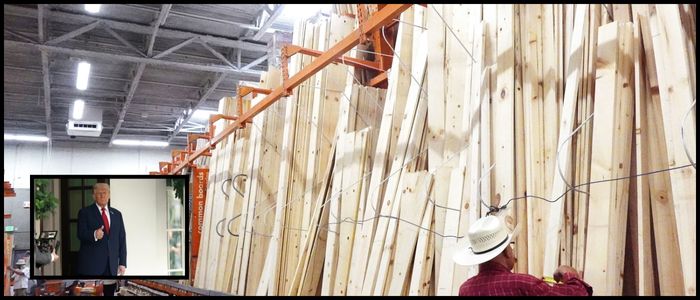In his proclamation, Trump said that America would impose a 10% tariff on softwood lumber and timber that comprises building products. A 25% tariff will be assessed on kitchen cabinets, vanities, and upholstered wood furniture.
The tariffs will go into effect on October 14. Beginning January 1, the tariff on cabinets will increase to 50%, and for upholstered furniture, to 30%.
Trump first announced the tariffs last week in a post on Truth Social. Concerns Over Building and Housing Costs Increase.
Industry experts are concerned that the tariffs may result in increased construction costs, which will exacerbate the affordability crisis in housing. Although the United States has approximately 300 billion trees, builders and economists explain that this would not be enough to meet the domestic demand.
Approximately 30% of the softwood lumber used in the United States is imported from Canada, where duties of 14.5% are currently being imposed for countervailing and anti-dumping.
Since lumber is a requirement for homebuilding, an increase in costs driven by tariffs would be anticipated to find its way into housing prices, with greater exposure nationally.
Furniture Prices Increasing
Consequences of the tariffs are already visible in furniture. Recently published government data shows that over the year to August 2024, furniture prices rose by 4.7% higher. Living and dining room furniture was higher still, at +9.5%.
The uptick follows Trump’s earlier tariffs on imports of furniture supplied by China and Vietnam, the leading two countries importing furniture into the United States. In total, last year, the two countries imported $12 billion in furniture and fixtures into the US.
Furniture prices had been on a general decline for approximately two and a half years prior to those tariffs. Trump has argued that foreign suppliers had entered the U.S. market for furniture, creating an oversaturation and, subsequently, tariffs would bolster American furniture manufacturing.
Furniture companies are already experiencing the effects. The stocks of a trio of furniture companies (Wayfair (W), RH (RH), and Williams-Sonoma (WSM)) dropped significantly after Trump confirmed his tariffs. He highlighted the difficulties faced by U.S. manufacturers, including the declining fortune of furniture manufacturing in North Carolina as a result of "cheap" imports.
Trump commented in a Truth Social post that foreign countries are "flooding" our markets with cheap furniture. He asserted that protecting our domestic manufacturers is critical to keeping our national safety and security and for the resurgence and revitalization of U.S. manufacturing.
Top

Trump Imposes New Tariffs on Lumber and Furniture

President Donald Trump has implemented new tariffs on foreign wood and wooden products, which include commodities such as lumber, timber, kitchen cabinets, and upholstered furniture. The changes could affect the costs of new housing construction and home furnishings, which have both already increased dramatically in price.











